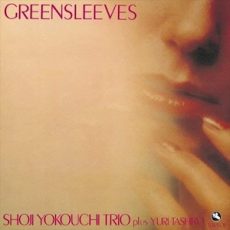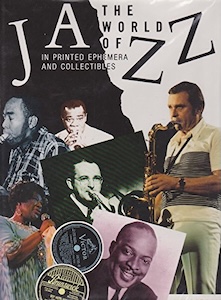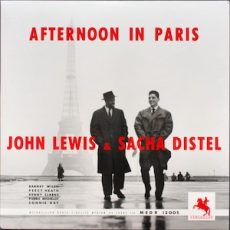
Requisites
Greensleeves ~ Shoji Yokouchi Trio plus Yuri Tashiro | By Eddie Carter
I was looking for something interesting to play at the start of my Tuesday morning when I came across an album by the Shoji Yokouchi Trio and Yuri Tashiro. Greensleeves (Three Blind Mice TBM-5011) is a 1978 release with a program of four jazz standards and three creative originals. The personnel consists of Yuri Tashiro on Hammond organ (tracks A1 to A4, B3), Shoji Yokouchi on folk guitar (tracks A1, A2), electric guitar (tracks A4, B1, B2), and gut guitar (tracks A3, B3), Kunimitsu Inaba on bass, and Hajime Ishimatsu on drums. The copy I own is the 2017 Impex Records U.S. Limited Edition stereo audiophile reissue, sharing the original catalog number. No. 2581 of 3000.
Side One opens with Willow Weep For Me by Ann Ronnell. Shoji’s gentle introduction gets things off to a good start for the quartet’s slow-paced melody. Shoji has the first say and tenderly embraces the opening solo. Yuri follows with a thoughtfully passionate reading, while Kunimitsu and Hajime complement both elegantly into the theme’s reprise and finale. Bobby Timmons’ Moanin’ affords everyone solo space beginning with the quartet’s happy, upbeat theme. Shoji takes the song’s first lively reading, then Yuri makes her presence felt with skillful assurance. Kunimitsu follows with a brief statement, and Shoji and Hajime share a short exchange, preceding the closing chorus and vibrant climax.
Misty by Erroll Garner and Johnny Burke begins with Shoji setting the stage as he leads the ensemble through the gorgeous theme. He continues to reveal his lyrical side in a delicate opening statement. Yuri then enhances the song’s charm with a graceful interpretation. Kunimitsu and Hajime contribute the romantic, disciplined accompaniment, leading into the reprise and a soothing finale. The first of three compositions by Shoji Yokouchi, Drink Up, Vodka Martini, features the guitarist in a playful mood throughout the introduction and melody. As the song’s only soloist, Shoji conveys a driving vitality that bounces along, and the band’s chemistry shines, supporting him ahead of the melody’s restatement.
New Orleans Sunday is a trio performance featuring Shoji, Kunimitsu and Hajime. The trio puts the song through its paces with a catchy melody out of the gate. Shoji launches the opening with a driving rhythm, then Kunimitsu mines a vein of unsuspected riches in the following solo. Shoji and Hajime add a tasty treat in a short conversation before the trio’s reprise and conclusion. Greensleeves begins with a haunting intro, before picking up pace for the trio’s theme. Shoji takes the lead solo in a series of infectiously propulsive choruses. Kunimitsu goes for a lightly swinging walk next, then Hajime enters the spotlight to give a brief workout, leading back to the ending theme and soft summation.
Your Watch Is Ten Minutes Slow picks up the tempo one final time to wrap up the album. The quartet’s agile melody starts things off, then Shoji gets down to business on the opening solo. Yuri responds with a spirited reading ahead of the foursome’s return to the theme and close. Takeshi Fujii produced the initial session, and Yoshihiko Kannari managed the recording console. Bernie Grundman mastered this audiophile reissue, and Chris Bellman engineered it. The reissue features a thick cardboard cover; the sound quality is excellent, with a spacious, clear, and detailed soundstage. The record was pressed on 180-gram audiophile vinyl and is silent until the music begins.
Shoji Yokouchi recorded 46 albums over his career, and Yuri Tashiro released 51 titles over her career. If you’re in the mood for an album that weaves together beloved jazz standards with fresh, creative compositions, I invite you to check out Greensleeves by the Shoji Yokouchi Trio and Yuri Tashiro, the next time you’re out record-shopping. It’s an excellent place to start discovering the music of both artists. A delightful album that’s perfect for late-night listening and is sure to please any jazz enthusiast and fans of guitar and organ-centered ensembles!
~Misty, Moanin’, Willow Weep For Me – Source: JazzStandards.com ~ Greensleeves – Source: Wikipedia.org © 2026 by Edward Thomas Carter
More Posts: choice,classic,collectible,collector,guitar,history,instrumental,jazz,music,organ

On The Bookshelf
The World of Jazz | Jim Godbolt
This book is exciting and interesting in so many ways. It is filled with amazing pictures from the Jazz Age that make history feel real and alive. The images tell the story of how jazz began in New Orleans and traveled all over the world, growing into the music we know today.
The author, jazz historian Jim Godbolt, clearly loves jazz, and his passion shines through every page. He doesn’t just show photos of musicians and famous places. He also shares colorful artwork from record covers, posters, magazines, and record labels. Some of these designs are legendary, especially posters for Dizzy Gillespie and Jazz at the Philharmonic, as well as jazz magazines like Record Changer.
The story of jazz is told through old newspapers, posters, books, reviews, and rare photographs. Many of these items are hard to find, which makes the book feel like a treasure chest of history. You learn that jazz is not only about music, but also about how it was shared, recorded, advertised, and turned into a business.
The book shows how jazz started with young, self-taught musicians who had very little, and how it slowly became a huge, worldwide industry. It is a book you can read again and again. Every time you look at the pictures, you notice something new—from poor neighborhoods and riverboats to exciting nightclubs and beautiful concert halls around the world.
With its big pages and powerful images, this book is fun to explore, easy to enjoy, and full of inspiration. I highly recommend it.
The World Of Jazz: 1990 | Jim Godbolt

Requisites
Afternoon in Paris ~ John Lewis and Sacha Distel | By Eddie Carter
My mother was a big fan of The Modern Jazz Quartet, and today’s selection from the library highlights its founder and musical director, pianist John Lewis, joining French guitarist Sacha Distel on their 1957 collaborative album Afternoon in Paris (Atlantic 1267). It was one of her favorite records to play during our Sunday dinners growing up,and I had almost forgotten how enjoyable this album truly is. The supporting cast is superb: Barney Wilen on tenor saxophone, Pierre Michelot (tracks A1-A3) and Percy Heath (tracks B1-B3) on bass, Connie Kay (tracks A1-A3) and Kenny Clarke (tracks B1-B3) on drums. The copy I own is the 2021 French limited-edition mono audiophile reissue (Versailles MEDX 12005) released by Sam Records.
I Cover The Waterfront by Johnny Green and Edward Heyman, which opens side one, begins with John’s beautiful introduction. Sacha takes over to state the tasteful theme, and leads the way in a gorgeous reading. Barney has the last word in a warm performance that picks up pace until the pianist ends the way he began, softly. Dear Old Stockholm opens with piano, guitar, and tenor sax playing a brief segment of the melody, incorporating Pierre’s bass interlude, until it concludes. The pace picks up significantly for Barney’s swinging opening statement. Sacha delivers straight passion in the following solo, then John builds the third reading with smooth efficiency. All three soloists engage in a short exchange ahead of the pianist’s reprise and gentle ending.
The title tune, Afternoon in Paris by John Lewis, slows the pace to mid-tempo as the group begins the melody. Barney is the first to solo and cooks aggressively. Sacha steps in next to offer a splendid study in soulful improvisation. John makes his entrance with a perfectly locked-in groove. Pierre has the last word, and his sturdy bass lines lead the ensemble into the melody’s restatement. All The Things You Are by Jerome Kern and Oscar Hammerstein II gets side two underway with John’s pretty introduction. Barney launches into a swinging performance, then Sacha takes the reins and gets into a fantastic groove. John follows with a short solo, then he shares a brief word with Kenny before taking the song out softly.
Bags’ Groove by Milt Jackson got its title from the composer’s nickname. It opens with Barney stating the theme, leisurely, alongside Percy and Kenny. Sacha then begins the opening solo. John taps a creative vein next. Barney begins the third reading at ease, but gradually cruises to a satisfying climax. Percy and Kenny share a brief conversation preceding the theme’s reprise and summation. Ann Ronnell’s Willow Weep For Me begins with John’s gentle piano introduction, setting the stage for Sacha’s elegant, understated approach to the melody and his opening statement. The spotlight shifts to Barney, who delivers one of his most memorable solos on the album. John steps in last, providing a gorgeous improvisation that guides the ensemble to a graceful finish.
Although the producer of the original Afternoon in Paris session remains unidentified, Disques Versailles recorded the initial album, and Fred Thomas oversaw this audiophile reissue for Sam Records. The album’s sound quality is exceptional for a 1950s recording, with a warm, airy soundstage that makes you feel as if you’re in the studio with the musicians as they’re performing. It was remastered from the original tapes and pressed on 180-gram vinyl at Optimal Press using the Metal Mothers process from Pallas in Germany. This edition offers a listening experience that truly captures the album’s essence.
This was Sacha Distel’s sole album collaboration with John Lewis, yet both ensembles seamlessly integrate Lewis’s lyrical piano sensibility with Distel’s refined guitar elegance. The musicians’ interaction is both spontaneous and intuitive, culminating in six extraordinary performances. If you’re in the mood for an engaging blend of Bop and Cool Jazz, I cordially invite you to spend an Afternoon in Paris with John Lewis and Sacha Distel on your next record-shopping trip. I’m confident you’ll encounter a memorable album that will leave a lasting impression well beyond the record’s end!
~ All the Things You Are, I Cover The Waterfront, Willow Weep For Me – Source: JazzStandards.com ~Afternoon in Paris, Bags’ Groove, Dear Old Stockholm – Source: Wikipedia.org © 2026 by Edward Thomas Carter
More Posts: choice,classic,collectible,collector,guitar,history,instrumental,jazz,music,piano

On The Bookshelf
88: The Giants Of Jazz Piano
Ever wondered what made the piano gods of jazz so extraordinary? This captivating hardcover opens the door to 88 legendary artists who didn’t just play the piano—they transformed it into an instrument of revolution, soul, and pure genius.
Get ready to discover the fascinating stories behind the music. Each profile reveals not just what these pianists played, but who they were—their quirks, their breakthroughs, and the unmistakable fingerprints they left on jazz history.
The book takes you on an intimate journey with seven towering figures: Jelly Roll Morton, Earl Hines, Art Tatum, Thelonious Monk, Bud Powell, Keith Jarrett, and Cecil Taylor. But that’s just the beginning. You’ll also meet Mary Lou Williams, James P. Johnson, Count Basie, Duke Ellington, Nat “King” Cole, Dorothy Donegan, Oscar Peterson, Les McCann, Herbie Hancock, Dave Brubeck, Billy Taylor, McCoy Tyner, Chick Corea, Geri Allen, and 67 more innovators who pushed boundaries across every style imaginable—from stride’s joyful bounce to swing’s sophistication, bebop’s lightning-fast complexity to the fearless explorations of the avant garde.
At 344 pages packed with 100 stunning photos, plus a bonus CD featuring 11 essential jazz tracks, this is more than a book—it’s an experience. And with a foreword by Keith Jarrett himself, you know you’re in for something special.
Whether you’re a devoted jazz lover or just beginning your journey into this incredible art form, these stories will inspire, surprise, and maybe even change how you hear music.
88: The Giants Of Jazz Piano | Robert L. Doerschuk | Backbeat Books

Requisites
The Fox ~ Harold Land | By Eddie Carter
>This morning’s selection from the library features one of my favorite tenor saxophonists, Harold Land, who, alongside his band members, is in pursuit of a cunning opponent: The Fox (HiFi Jazz J 612/SJ 612), which initially hit the stores in 1959. Harold was a leading West Coast tenor saxophonist who played with some of the best jazz groups, including those led by Clifford Brown and Max Roach. After leaving the Clifford Brown-Max Roach Quintet to prioritize his family life in California, he may have sacrificed the chance for even greater recognition. Still, his impressive discography continues to illuminate a career that lasted almost fifty years. Land receives exemplary support on this date from Dupree Bolton on trumpet, Elmo Hope on piano, Herbie Lewis on bass, and Frank Butler on drums. My copy is the 1975 U.S. Stereo reissue (Contemporary Records S7619).
Side One kicks off with the title track, The Fox, a high-energy opener by Harold Land that is fueled by the quintet’s theme. The tune takes its name from a nickname given to Harold by drummer Lawrence Marable. Land leads the way, delivering a solo bursting with fiery passion. Bolton steps in next and cooks hard. Hope surges ahead with an energetic touch in the following reading. Butler then engages in a lively and playful exchange with the front line, until the theme’s reprise brings the tune to an abrupt and thrilling end. Mirror-Mind Rose, the first of Elmo Hope’s four contributions, serves as a lyrical showcase for Land, whose opening solo after the ensemble’s touching theme paints an affectionate, mellow soundscape. Bolton’s turn is a dreamy, gorgeous presentation, and Hope wraps up the solos with elegance before the group gently ends the tune together.
Hope’s One Second, Please is a rocking groove with dynamic interaction between both horns and the trio on the melody. Harold lets his horn do the talking in the opening statement. Dupree responds by getting so many ideas into the second solo. Elmo glides efficiently over the rhythm section’s backdrop next. Frank collaborates with the front line in the closing segment preceding a satisfying finale. Sims-A-Plenty, Hope’s third original starts Side Two with the unfolding of a cheerful, mid-tempo theme by the quintet. The pianist steps up first, building the opening solo into a firm, solid groove. Land matches the momentum with a swinging statement next. Bolton impresses with inventive, nuanced lines in a remarkable interpretation. Butler moves toward the reprise with exciting agility on the closer preceding the ensemble’s cohesive finale.
The playful spirit of Little Chris radiates the joy and happiness Harold Land felt for his then nine-year-old son, and that feeling shines through in the quintet’s opening notes of the melody. Harold takes the lead with a captivating statement that draws thelistener in. Bolton brings a bright, assertive tone and confident energy to the second reading. Hope makes his entrance next and swings soulfully, then Butler adds a few lively thoughts before the quintet reassembles for the closing theme. One Down by Hope begins with Butler’s breezy, island-inspired introduction, ahead of the group’s medium-fast melody. Bolton opens the solos with seasoned flair, then Elmo responds with polished virtuosity. Harold takes up the next spot vigorously, and Frank adds the exclamation point in a brief but effective solo before the quintet returns to take the song out.
Bassist Herbie Lewis is the only member of the quintet who doesn’t take a solo on any track, but his presence is truly felt throughout. His controlled strength and engaging ensemble playing create a reliable, steady foundation that beautifully supports Land, Bolton, Hope and Butler at the forefront. This album was produced by David Axelrod and recorded by Art Becker and David Wiechman at Contemporary Records. The reissue’s sound quality is first-rate and offers its owner a marvelous stereo listening experience. For fans of West Coast Jazz, the incredible interaction among the musicians is captivating, and these performances are definitely worth exploring. The Fox by Harold Land may seem like an elusive adversary during your record-shopping hunt, but once you acquire it, it won’t bite or attack; instead, it could become a treasured addition to your jazz library!
~ Little Chris – Source: Album liner notes by Leonard Feather ~ Lawrence Marable was also known as Larance Marable – Source: Wikipedia.org. © 2025 by Edward Thomas Carter
More Posts: choice,classic,collectible,collector,history,instrumental,jazz,music,saxophone




